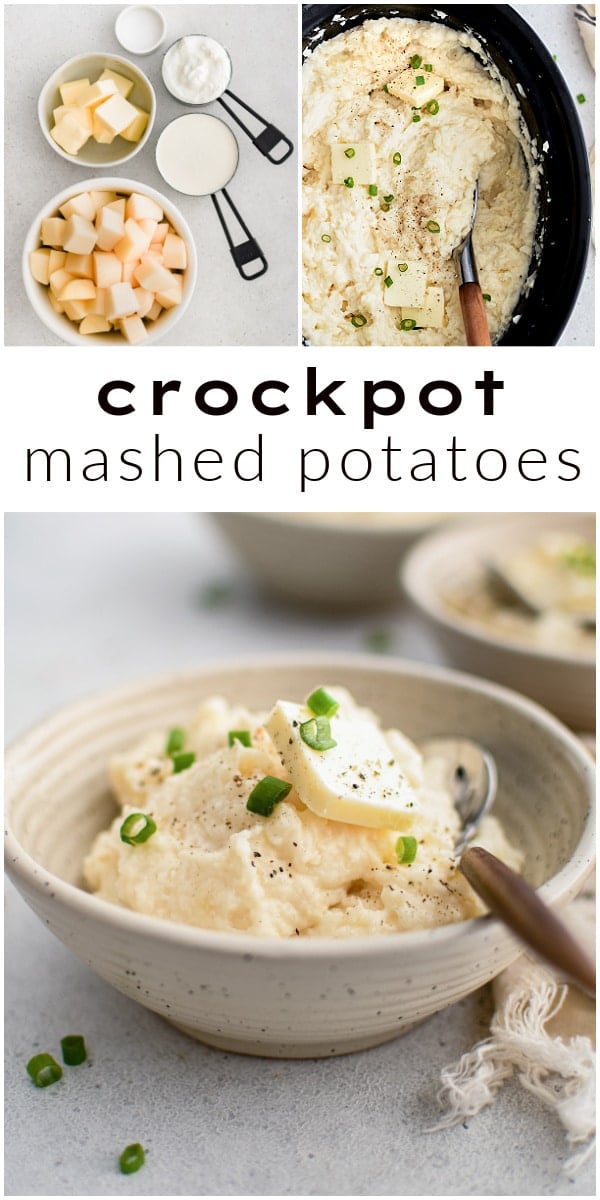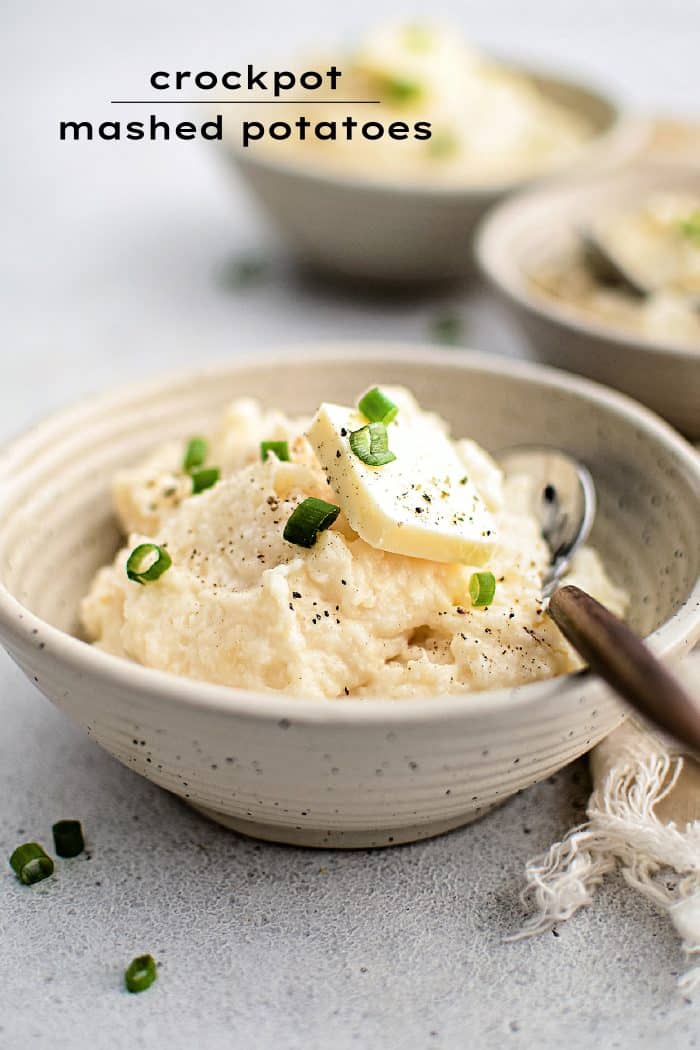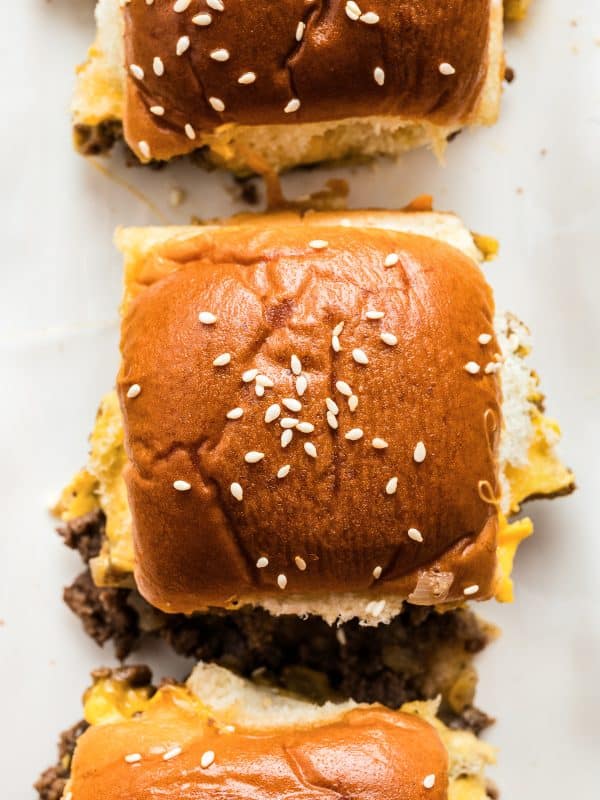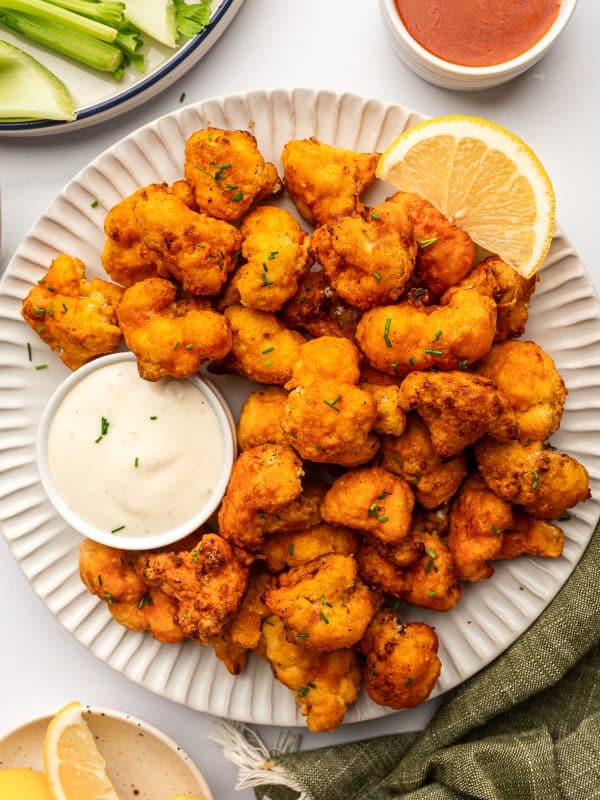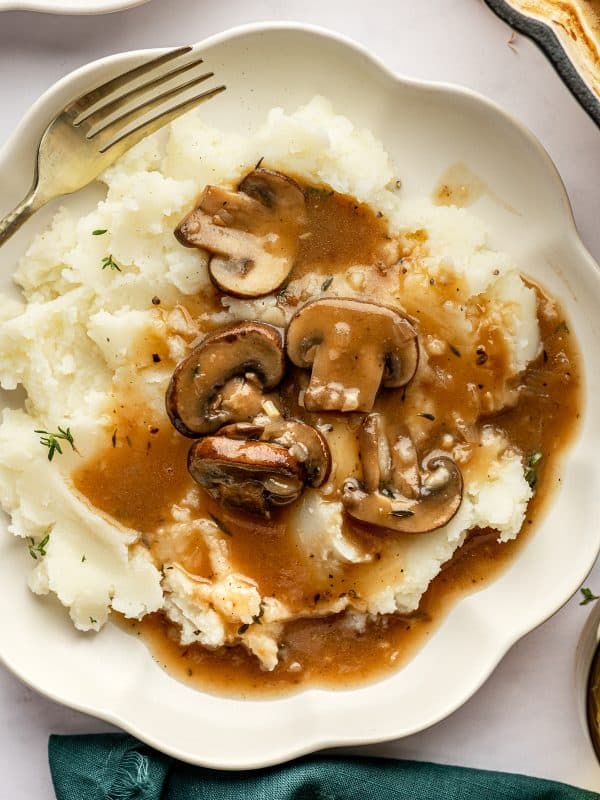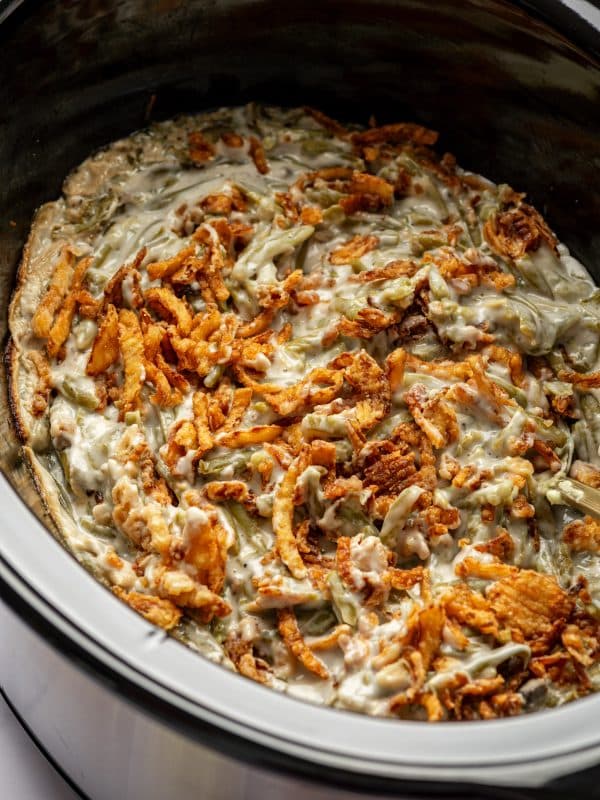This post may contain affiliate links. See my disclosure policy.
Crockpot Mashed Potatoes are the perfect rich and creamy hands-off side dish for busy weeknights and holiday feasts! You only need russet potatoes, heavy cream, sour cream, salt, and lots of butter.
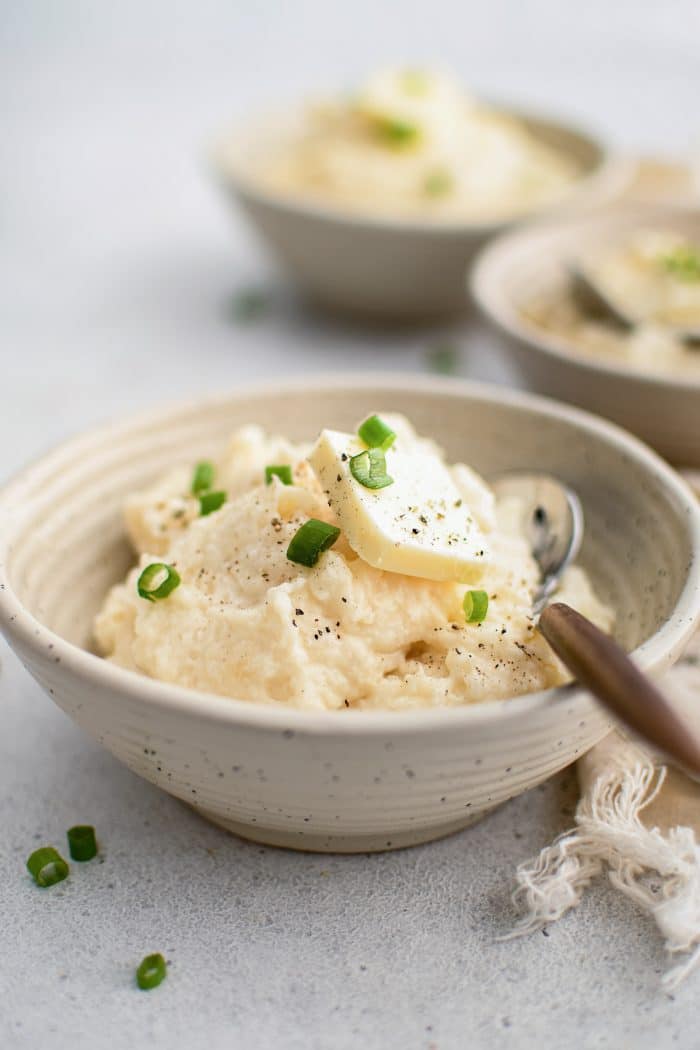
Table of Contents
I grew up watching my dad make mashed potatoes on the stovetop, but it just so happens that deliciously creamy mashed potatoes can also be made in the slow cooker. This is a game-changer, especially for meal prep and holiday entertaining when stovetop burners are hard to come by.
Key Ingredients
Find the printable recipe with measurements in the recipe card below.
This crockpot mashed potato recipe calls for four main ingredients: potatoes, heavy cream, sour cream, and butter. Plus salt and black pepper, of course. A simple mash like this is perfect alongside your next Thanksgiving turkey and homemade turkey gravy, flavorful sauces, and rich stew.
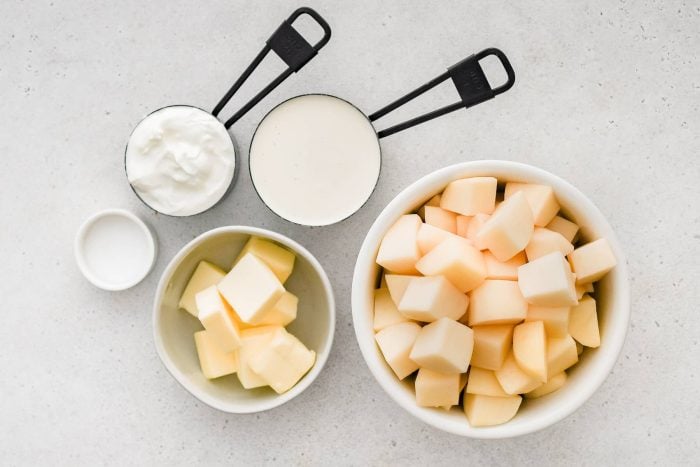
- Potatoes: What are the best potatoes for mashing? This depends on who you ask, but the general consensus is russet potatoes and Yukon Golds. Russet potatoes make light, fluffy, and smooth mashed potatoes when made properly. They are high starch, low moisture potatoes that absorb liquids like butter, cream, and broth well but turn gluey when overmixed. Yukon Gold potatoes, on the other hand, are naturally creamy and buttery and generally make a denser mash. They have a medium starch level, protecting them from turning gluely when overmixed (at least a little).
- Heavy Cream: If calories are of no concern, heavy cream will give the most decadent flavor. Suitable alternatives include half-and-half, whole milk, or buttermilk. Low-fat milk is not recommended.
- Sour Cream: I love sour cream in my mashed potatoes. The slight tanginess is a must! Feel free to use full-fat sour cream or full-fat plain Greek yogurt.
- Butter: Salted or unsalted is up to you. I always use salted butter, but if you’re concerned about the total sodium content, you may want to use unsalted and season to taste.
Optional Additions
Three optional additions come to mind for stand-out crock pot mashed potatoes.
- Cream cheese: Cream cheese adds a luscious, velvety texture to your mash, making it extra rich. It also adds thickness and structure, preventing them from becoming too runny. Use about 8 ounces of room-temperature cream cheese for 6 pounds of potatoes.
- Roasted garlic: Roasted garlic adds a mellow, nutty, slightly sweet garlic flavor. Use 1-2 whole bulbs of roasted garlic for 6 pounds of potatoes.
- Fresh herbs: For brightness and freshness that balances the richness of the potatoes include 3-4 tablespoons of fresh herbs. I love adding chives, parsley, and rosemary.
How to Make Crock Pot Mashed Potatoes
Making mashed potatoes in the crockpot is as easy as dumping, cooking, mashing, and seasoning. Check out the detailed instructions below.
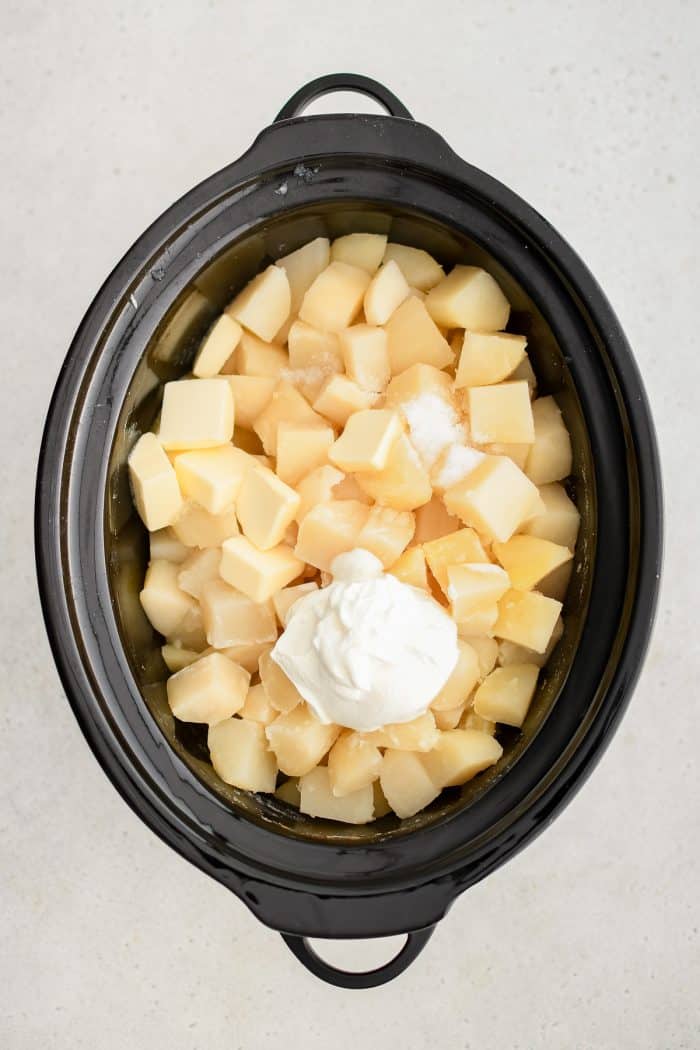
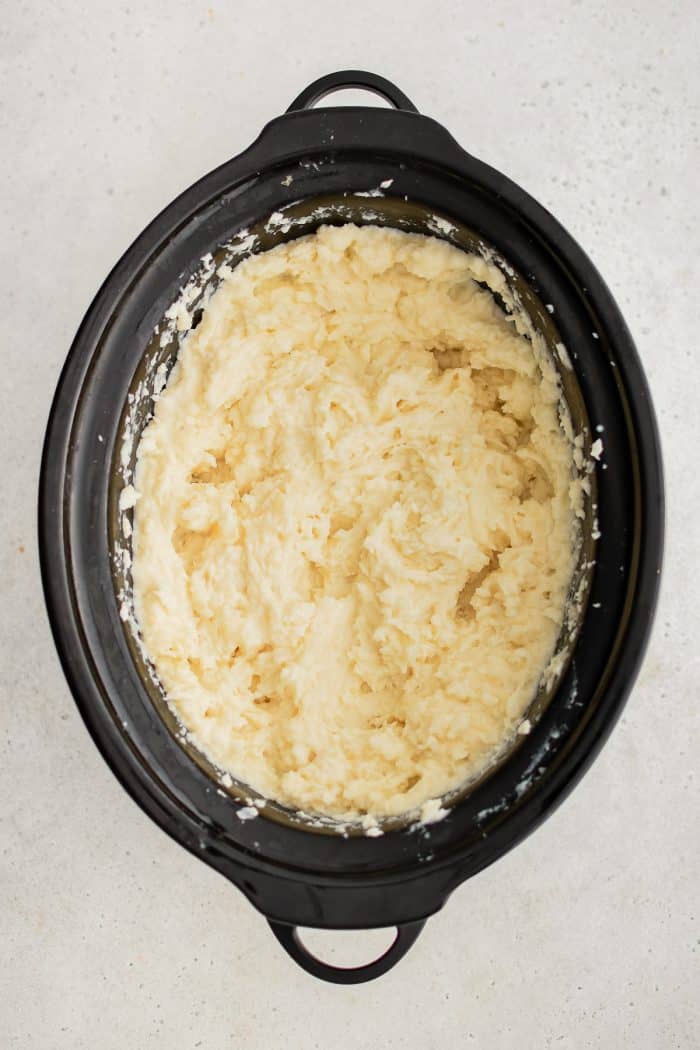
1. Prepare the potatoes. Peel the potatoes, then chop them into 1/2 to 1-inch cubes equal in size so that they cook evenly. Place them in the bottom of a 7-quart crockpot or larger.
2. Add the cooking liquid and butter. Add three cups (24 ounces) of water or broth to the slow cooker, then dot the top of the potatoes with 1/2 stick (4 tablespoons) of butter and sprinkle (generously) with salt and black pepper.
3. Cook the potatoes. Cover and cook on low heat for 6-7 hours or on high for 3-4 hours. The potatoes are cooked when they’re easily pierced with a fork.
4. Drain. Carefully drain any excess liquid from the crockpot.
5. Add the remaining ingredients and mash. Add the room-temperature sour cream, heavy cream, and butter to the crockpot filled with the cooked potatoes. Mash with a potato mashed for chunkier potatoes, or use a potato ricer for a smoother mash.
6. Season and adjust ingredients to taste. Add additional salt and black pepper to taste, and add additional dairy (butter, cream, or sour cream) for richness.
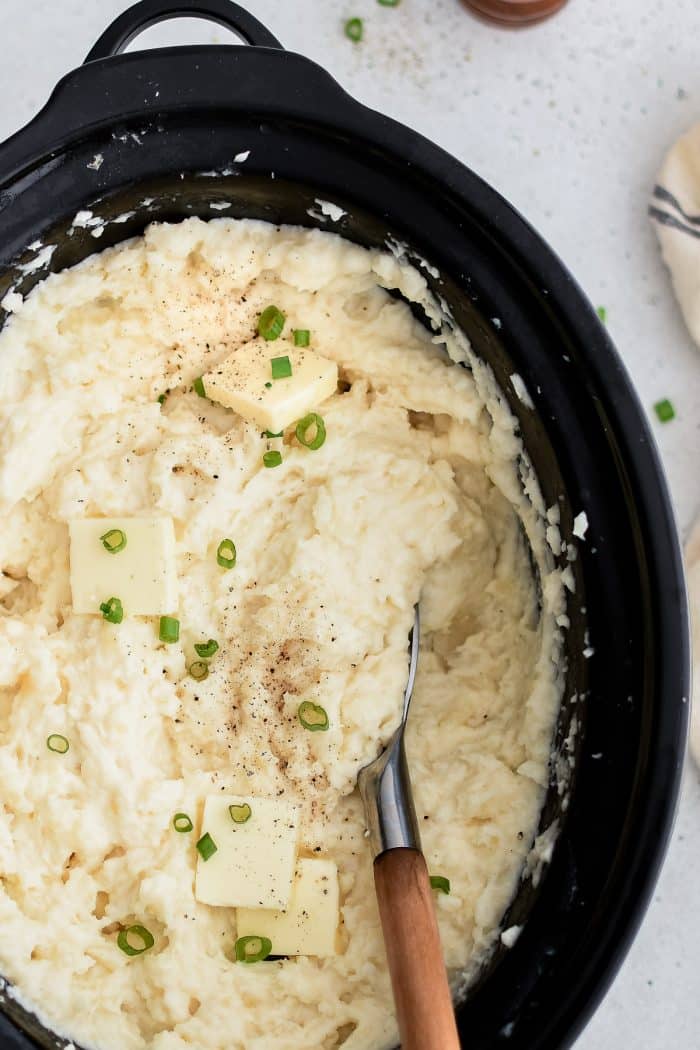
Recipe Tips
After countless nights serving these crockpot mashed potatoes, here’s a list of my top cooking tips:
- Use a mix of Russet and Yukon Golds. For the perfect balance of fluffy and creamy mashed potatoes, try using an equal combination of each.
- Cook the potatoes in broth or cream. Instead of cooking the potatoes in water, use chicken or vegetable broth (or even heavy cream!) The result will be richer, more flavorful mashed potatoes.
- Avoid cold dairy. Ensure your dairy (butter, milk, cream, sour cream) is brought to room temperature or gently heated before adding to the cooked potatoes.
- Salt generously. For the flavor of potatoes to pop, they need salt.
- Avoid overworking the potatoes. Overworking leads to gluey, gummy mashed potatoes.
Frequently Asked Questions
Yes and no. If you’re using Russet potatoes, I highly recommend peeling your potatoes as they have tough, thick skins even after cooking. Yukon Gold and red potatoes (another popular type of potato for mash) have thinner skins and don’t require peeling.
This is perhaps one of the best parts of the slow cooker. Simply set your machine to “warm,” and your crockpot will keep them warm for you. After about two hours, you may need to add a splash of broth or cream to loosen them up.
Yes. Maybe you made your mashed potatoes a day in advance, or you have leftovers. Reheat in the crockpot on low for 2-3 hours with a bit of extra cream, butter, or sour cream to return moisture.
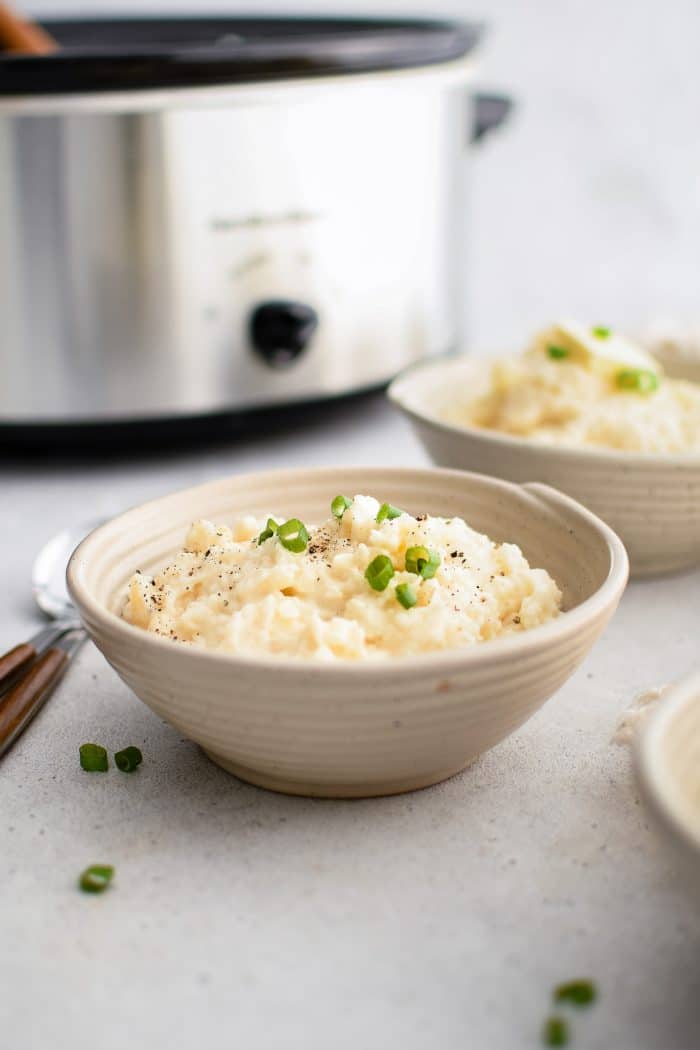
Helpful Cooking Tools for this Recipe
Check out all of my kitchen essentials. (Amazon affiliate links*)
- You’ll need a large Crockpot/slow cooker to make this recipe. I own this basic 7-quart crock pot and this programmable 8-quart Crock Pot. Both work great for this recipe.
- I also recommend mashing your potatoes with an old-fashioned potato masher or a potato ricer. Although an electric mixer is fast and convenient, it’s easy to overwork your potatoes that way.
*As an Amazon Associate, I earn a small percentage from qualifying purchases.
More Mashed Potato Recipes
Mashed potatoes are one of my family’s favorite side dishes. From classic mashed potatoes to roasted garlic mashed potatoes, there’s never a dull plate with these delicious recipes.

Crockpot Mashed Potatoes Recipe
Ingredients
- 6 pounds potatoes, peeled and diced into 1-inch cubes
- 3 cups water, or chicken broth
- 1½ sticks butter, divided, at room temperature
- 1 cup heavy cream, plus more if needed, at room temperature
- 1½ cup sour cream, at room temperature
- salt and black pepper, to season
Instructions
- Peel the potatoes, then chop them into 1/2 to 1-inch cubes equal in size so that they cook evenly. Place them in the bottom of a 7-quart crockpot or larger.
- Add three cups (24 ounces) of water or broth to the slow cooker, then dot the top of the potatoes with 1/2 stick (4 tablespoons) of butter and sprinkle (generously) with salt and black pepper. Note: It's ok if the potatoes are not fully submerged in liquid.
- Cover and cook on low heat for 6-7 hours or on high for 3-4 hours. The potatoes are cooked when they’re easily pierced with a fork.
- Carefully drain any excess liquid from the crockpot.
- Add the room-temperature sour cream, heavy cream, and butter to the crockpot. Mash with a potato masher for chunkier potatoes, or use a potato ricer for a smoother mash.
- Add additional salt and black pepper to taste, and add additional dairy (butter, cream, or sour cream) for richness.
Notes
- Russet or Yukon Gold potatoes are the best potatoes for this recipe. You could even use a combination of each.
- Use the quantities of butter, cream, and sour cream as a suggestion. Feel free to add more or less to taste.
- Cook your potatoes in broth for more flavorful mashed potatoes.
- Avoid over-mixing the potatoes.
- Keep leftovers stored in an airtight container in the refrigerator for up to 3-4 days.
Nutrition
Nutrition information is automatically calculated, so should only be used as an approximation.
